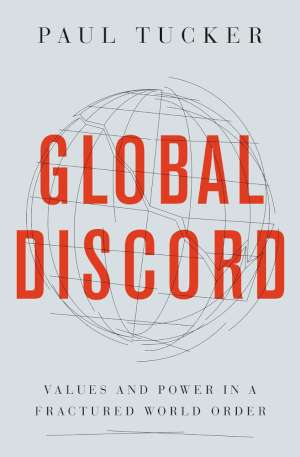23 November 2022
Global Discord
Values and Power in a Fractured World Order
Paul Tucker
2022, Princeton University Press, 533 pages,
ISBN 9780691229317
Reviewer: Kevin Gardiner, Rothschild & Co/Cardiff Capital Region Econ Growth Partnership

This is a scholarly book by an intellectual heavyweight which is also chock-full of practical insight. Tucker is a fellow at the Harvard Kennedy School, but has been a senior official at the Bank of England and the BIS. In a dumbed-down era it is refreshing to find difficult and important ideas taken seriously, and by someone who knows how they matter.
Tucker sets out to summarise, critique and analytically improve upon the subject matter of international relations, in the context of a multi-polar world in which at least one of the most important players does not share the individualist and liberal perspectives of the pre-WW1 European order and its US-led successor.
Trade and finance are central to international relations, and much of the book looks at geopolitics through the lens of geo-economics. It offers careful discussions of sovereignty and legitimacy, often starting from first principles (such as the question of whether there is such a thing as natural law, the role to be played by ethics, Rawls’ suggested rules for a just society of states). Throughout, Tucker uses terms and scenarios from game theory, but without recourse to spurious mathematics. The many notes – almost a thousand – are helpfully presented as footnotes, not end notes.
He does not predict a single most likely course of events, but offers four scenarios – “lingering status quo”, “superpower struggle”, “new Cold War”, “(truly) reshaped world order” – through which to frame his thoughts. That says, he does suggest that the probability of there not being a decisive superpower conflict at some stage in the next fifty years may be “somewhere over 90 percent, leaving a nearly 10 percent chance of disaster”(p118) – which he sees as scary but which arguably, in the light of recent broadsheet prognostication, may almost be reassuring. Tucker is not in thrall to Thucydides.
Impressively for a book published comfortably before the end of 2022 he is able to include numerous references to Russia’s invasion of Ukraine and some of its plausible effects on his analysis. There is an appendix listing Tucker’s own suggested principles for cooperation between states. His stance throughout can perhaps be summarised as that of a realistic liberal democrat.
The book’s arguments are often involved and nuanced, and there is much referring back and forth to its developing sections and themes: it needs to be read carefully. But for this non-specialist, it would have been a worthwhile read simply for the historical account of the growth of the various world “orders”, and of the development of our thinking about them, alone. I also enjoyed his discussion of reserve currency status – and the implicit rebuke to those who think that the renminbi can replace the dollar while China is running a structural current account surplus.
That said, I am not convinced by the conventional account – which Tucker accepts – of the passing of the gold standard: “Initially, the general float led to runaway inflation in most of the advanced economies…” (p380). He writes – as do many others – as if leaving gold was a deliberate choice, as if there was an alternative, when it seems to me that such a rigid mechanism simply could not deal with the increasingly complex global economy. Leaving gold did not cause inflation: inflation caused the demise of the gold standard. More pedantically, Tucker talks of rules for “cross-border investment (generally known as foreign direct investment)” (p93), but not all cross-border investment is FDI, and not all FDI involves active cross-border flows.
Two other quibbles. First, for this reader the author’s erudition sometimes backfires: he often seems to be saying “Here’s why a commonplace idea that you would not ordinarily consider of interest, advanced by somebody you may not have heard of who happened to be publishing in a much less competitive field than today’s, may not matter as much as somebody else (who also happened to be publishing…etc) said it did.” (My words, of course, not his!)
Second, today’s international relations are being shaped by Trump, Biden, Farage, Johnson, Putin, Xi et al. They may use words like “sovereignty”, but I doubt they think as deeply about it as this – or any other – book does. Touché, Nige.
But all told: I learned a lot and can only applaud the breadth of vision and ambition. Bravo.
